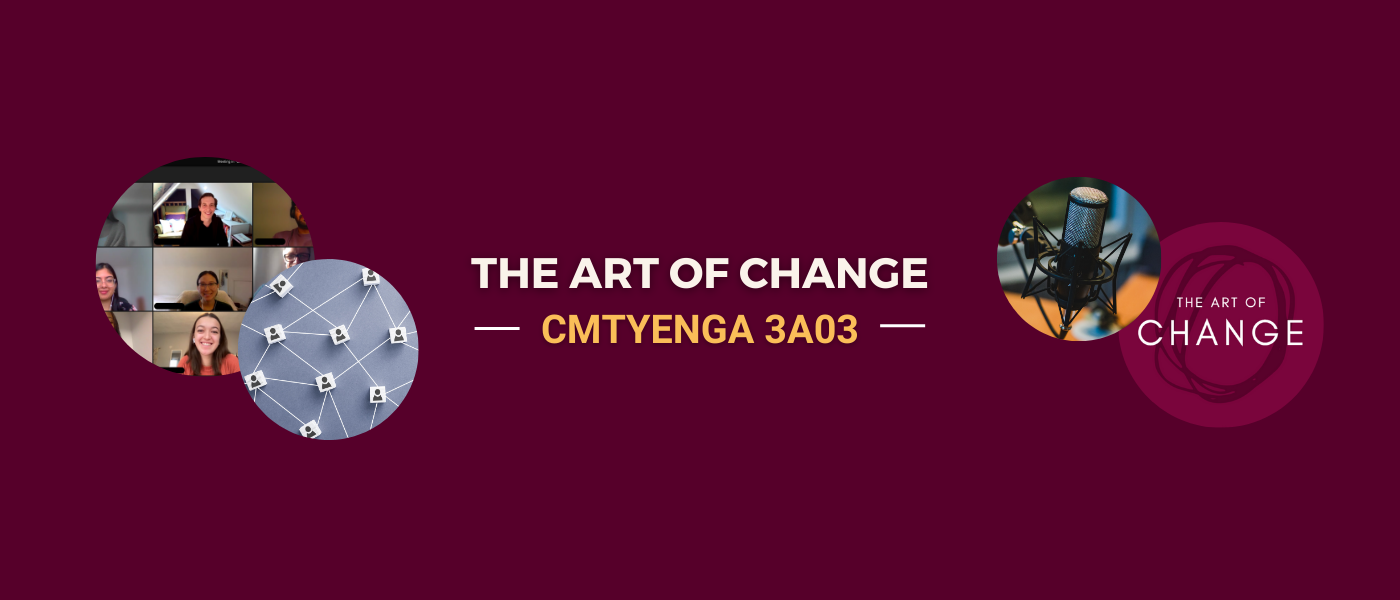Overview
How does change happen? Students in the Art of Change set out to investigate this question while connecting the theories of change and systems thinking with real-world practice. A key component of the course is the Art of Change podcast, which was produced with funding support from the province of Ontario’s eCampusOntario Virtual Learning Strategy. The podcast is centered around the voices of change-agents in Hamilton and beyond, and introduces students to case studies that highlight the tools and skills needed to support change at individual, systems, and organizational levels. The course and podcast are centered around, but not limited to, themes and topics related to the COVID-19 pandemic, climate change, truth and reconciliation, infrastructure and housing, as well as equity, diversity and inclusion.
AOC Course Outlines
Information Box Group
AOC Past Projects
Winter 2024 Projects
Housing, Sprawl, & Municipal Governing
This project hosted a knowledge mobilization session to discuss the impact of spawl on the environment, housing prices, and farming. Concerned about the Greenbelt scandal and increasing rental costs, students invited Stop Sprawl Students to talk about their work and share community strategies to protect the environment in Hamilton and Ontario.
Project Partner: Stop Sprawl Students
Public Transportation, LRT, & Sustainable Infrastructure
This project explored the intersections of Public Transportation, Sustainable Infrastructure and LRT. Specifically, delving into community perspectives surrounding Hamilton’s LRT project – housing, active transportation, public transit, city building were central components of information sharing among students and residents of Hamilton.
Project Partners: Hamilton Community Benefits Network, McMaster Student’s Union, and Students for McMaster Bike Share
Protecting Green Spaces, Public Spaces and Communities
This project hosted a community dialogue with McMaster Greenhouse to discuss the importance of protecting green spaces and public spaces. Students focused on the connection between green spaces and social cohesion, health, and community/city building.
Project Partners: McMaster Greenhouse, Department of Biology, MacChangers, Green Venture, and Green Cities Foundation
Winter 2023 Projects
Bay Area Restoration Council
This project focused on advancing ideas about how the Bay Area Restoration Council’s Let’s Talk Water tool—focused on the Chedoke Creek watershed as inspired by John Terpstra’s Daylighting Chedoke—can be used as a catalyst for conversation with Hamiltonians about our relationship with the watershed.
Project Partner: Bay Area Restoration Council
Environment Hamilton
This exploration brought forward ideas that Environment Hamilton can advocate for as the City creates new entities—such as a Climate Advisory Committee—to advance climate change work in Hamilton, with a focus on increasing citizen engagement with these processes.
Project Partner: Environment Hamilton
Hamilton Community Benefits Network
This project explored ideas for increasing resident engagement with a focus on identifying creative ways that the City of Hamilton can make municipal budget processes more accessible to residents and thus encourage their engagement in budget decisions that impact the community.
Project Partner: Hamilton Community Benefits Network
Hamilton ACORN
This project advocated for an extreme heat by-law to protect vulnerable tenants. Students identified other municipalities in the United States and globally that have developed extreme heat by-laws in order to make recommendations on what a Hamilton by-law might look like and to identify how various stakeholders might be engaged in this process.
Project Partner: Hamilton ACORN
City of Hamilton
This project aimed to identify actionable priorities following the approval of the Community Energy and Emissions Plan and Climate Change Impact Adaptation Plan in August 2022. It focuses on deepening relationships and engaging with residents, neighborhood groups, and local organizations to identify projects for collaborative community engagement. The goal is to prioritize projects for the Fall 2023 CityLAB Hamilton Semester in Residence program.
Project Partner: Climate Change Initiatives Office, City of Hamilton
Winter 2022 Projects
Project Team 1: Inclusionary Zoning & Transit Oriented Development
Exploring municipal and provincial levers to advance inclusion of affordable housing policies into plans for the Hamilton Light Rail Transit corridor.
This work would align with the Hamilton Community Benefits Network.
Project Partner: Karl Andrus
Students: Amandeep Saini, Hartley Kostrzewa, Summer Akhtar, Ali Siddiqui, Raagavi Ramenthiran
Project Team 2: Intensification and Affordable Housing
Increasing the Spectrum of Housing Choices: Building on outcomes of the Stop the Sprawl movement, this work would focus on identifying levers required to broaden the spectrum of housing options as Hamilton increases density targets. This could also involve exploring opportunities to educate the public on what these options are.
This work would align with Environment Hamilton.
Project Partner: Lynda Lukasik
Students: Kailey Cutillo, Ardyn Gibbs, Thalia Thompson, Zoe Ullyett, Rachel Carson
Project Team 3: Housing Displacement and Supply
How do we prevent people who are in precarious housing circumstances from being displaced? As housing options in the region become increasingly expensive, how might we preserve affordable housing stock?
This work would align with Acorn Hamilton.
Project Partner: Olivia O’Connor
Students: Kemi Adesina, Alysha Birdi, Victoria Sawicki, Victoria Iro, Mar Tut, Vithuyan Sugumar
Project Team 4: Amenities and Wrap Around Services
What supports are required for people living in affordable housing units with regards to support services and amenities? What barriers do people face and how might these be removed? What are the unique barriers that specific communities and/or marginalized groups face in relation housing?
This work would align with the YWCA Hamilton and United Way Halton and Hamilton.
Project Partner: Violetta Nikolskaya (YWCA), Kirstin Webb (UWHH)
Students: Bianca Mancino, Sharon Lim, Nicole Schandl, Arden Jacoby, Katelyn Curkan
AOC Podcast
How does change happen? Join us, The Art of Change Team, as we learn from activists, academics, policy makers, community organizers, and engaged citizens driving change in their communities. Focusing on case studies in Hamilton, Ontario, we will learn about the tools and skills needed to support change at individual, systems, and organizational levels. This podcast is produced by the Office of Community Engagement at McMaster University for the CMTYENGA 3A03 course, with funding support from eCampus Ontario’s Virtual Learning Strategy.
Information Box Group

Ep. 1: Welcome to the Art of Change Listen Now
What is The Art of Change? In this introductory episode, the instructional team sits down to talk about zoom meetings, Trello boards, and the development of The Art of Change course and podcast.

Ep. 2: Hamilton's LRT Project Listen Now
How does change happen within and outside of organizations? In Episode 2, Maureen Wilson and Ryan McGreal reflect on the time needed for change to occur in the context of Hamilton’s Light Rail Transit (LRT) project. Then, Karl Andrus speaks about the power of community in voicing change through community benefits.

Ep. 3: Just Recovery Hamilton Listen Now
How can the Just Recovery model be used to influence change? In Episode 3, Kim Martin, Lynda Lukasik, and Kojo Damptey speak about their work with Just Recovery Hamilton: a coalition of 11 community organizations in Hamilton, Ontario that formed during the COVID-19 pandemic.

Ep. 4: Public Space and the COVID-19 Pandemic Listen Now
How has the COVID-19 pandemic changed how we think about and use public space? In Episode 4, Jason Cassis discusses Hamilton’s pandemic patio program and the seasonal pedestrianization of King William Street. Then, Koubra Haggar and Merima Menzildzic speak about their work with the Hamilton Encampment Support Network and the City of Hamilton’s response to encampments in public parks during the COVID-19 pandemic.

Ep. 5: Housing Affordability in Hamilton Learn More
How have individuals and organizations approached the ‘wicked’ problem of housing affordability? In Episode 5, Nrinder Nann and Medora Uppal speak about their work to tackle the supply side of housing affordability with the Hamilton is Home coalition. Then, Calogero Mattina describes how Hamilton’s Community Land Trust is working to address the challenge of perpetual affordability.

Ep. 6: Activism: From Red Hill Valley to Stop Sprawl HamOnt Listen Now
What’s the role of activism in changemaking processes? In Episode 6, Don McLean and Michael Doxtater reflect on their experiences with activism in Hamilton’s Red Hill Valley. Shifting to contemporary efforts, Lilly Noble discusses activism in the context of Hamilton’s proposed urban boundary expansion.

Ep. 7: Climate Policy Change Listen Now
How can policymaking be used to address climate change? In Episode 7, Catherine McKenna reflects on her work negotiating federal climate targets and action plans as Canada’s former Minister of Environment and Climate Change. Then, Carole Saab discusses the role of the Federation of Canadian Municipalities in advancing intergovernmental conversations about climate policy.

Ep. 8: Championing EDI at McMaster University (Part 1) Listen Now
How have individuals and coalitions advanced equity, diversity, and inclusion (EDI) at McMaster University? Episode 8 is Part 1 of a 2-part series about organizational change. In Part 1, Dr. Ameil Joseph shares his experience advocating for change with respect to EDI at McMaster as part of groups such as PACBIC and ACFAM.

Ep. 9: Championing EDI at McMaster University (Part 2) Listen Now
How have individuals and coalitions advanced equity, diversity, and inclusion (EDI) at McMaster University? Episode 9 is Part 2 of a 2-part series about organizational change. In Part 2, Dr. Arig al Shaibah speaks about the importance of action planning and fostering hope when advancing organizational change. Then, May-Marie Duwai-Sowa discusses the role of data collection in organizational change processes.

Ep. 10: Change in Action: Organizing a Community Dialogue Listen Now
What projects have students been championing in the Art of Change course? Episode 10 is a course-update, as students from the Art of Change course join community partners from the Just Recovery Hamilton Coalition to speak about their work planning a dialogue on the topic of housing.

Ep. 11: Public Art and Social Change Listen Now
How is visual art implicated in social, political, and personal change processes? In episode 11, artist and educator Hiba Abdallah speaks about the role of public art in challenging perspectives, building community, and poking at systems.

Ep. 12: Indigenous Changemakers (Part 1) Listen Now
How have Indigenous leaders approached social and political changemaking? Episode 12 is Part 1 of a two-part series. In Part 1, Jordan Carrier reflects on how different aspects of her identity as a mom, a Plains Cree woman, a caretaker, a learner, a teacher, and more, factor into her work as a community organizer who is committed to passing lessons of advocacy and social justice on to future generations.

Ep. 13: Indigenous Changemakers (Part 2) Listen Now
How have Indigenous leaders approached social and political changemaking? Episode 13 is Part 2 of a two-part series. In Part 2, Mumilaaq Qaqqaq reflects on the opportunities and challenges that she experienced as young, Inuk woman representing Nunavut as a Member of Parliament.

Ep. 14: Changemaking Toolkit Listen Now
What happens next? In Episode 14, activists, academics, policy makers, and community organizers share advice to students seeking to make change in their communities. Don’t forget to check-out the Changemaking Toolkit Document, which includes a list of resources recommended by podcast guests.

Ep. 15: Change in Action: Students Reflect on the Art of Change Course Listen Now
What have students learned in the Art of Change course? Episode 15 is a reflective conversation that was recorded in April 2022 during the final Art of Change class. In this episode, students discuss skills they have gained through the course, aspects of the project work that surprised them, and advice that they might give to other students seeking to make change in their communities.

Ep. 16: Change in Action: Outcomes from the Art of Change Course Listen Now
What projects have students worked on in the Art of Change course? Episode 16 is a discussion with students and Just Recovery Coalition partners about the outcomes of their project work in the Art of Change course.

